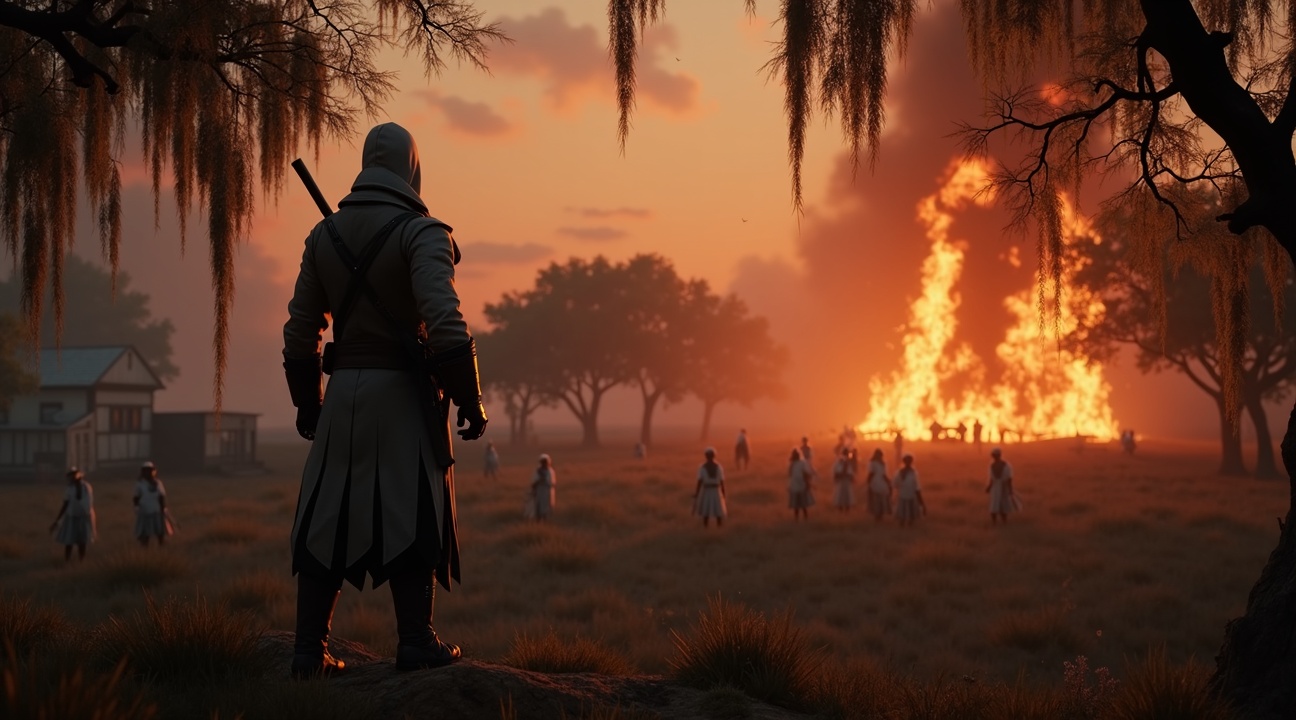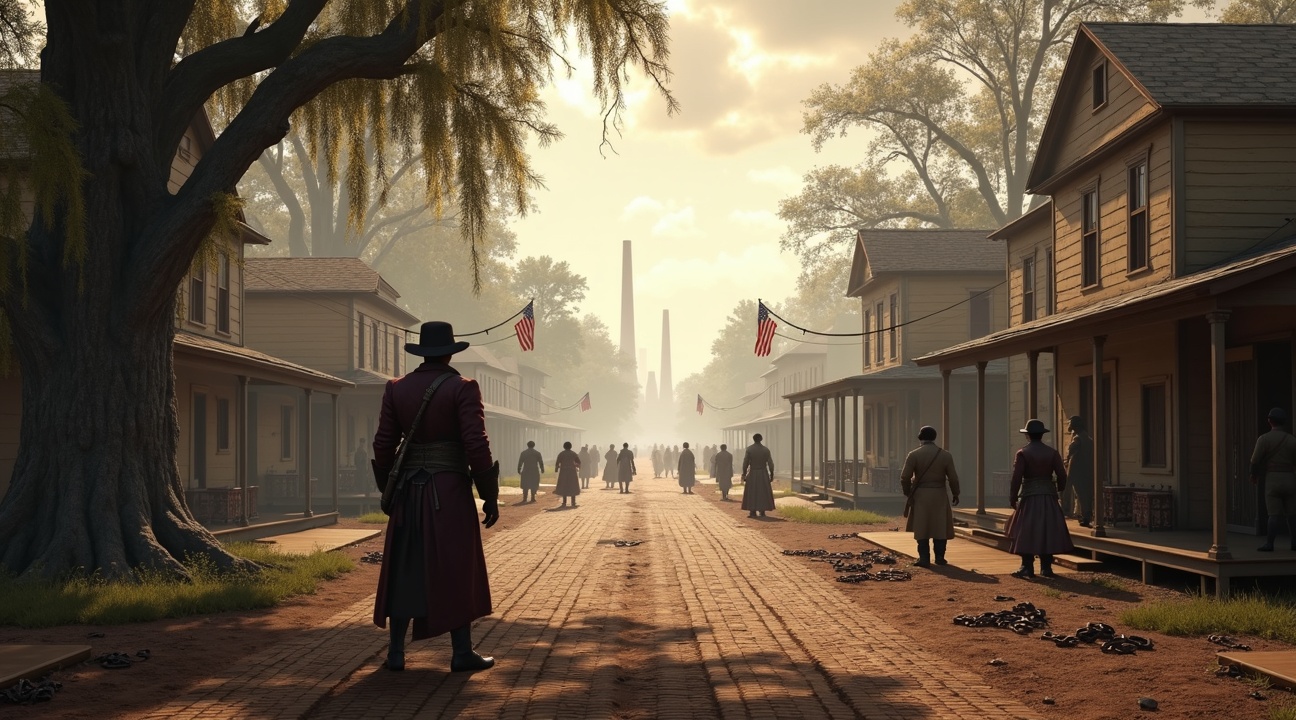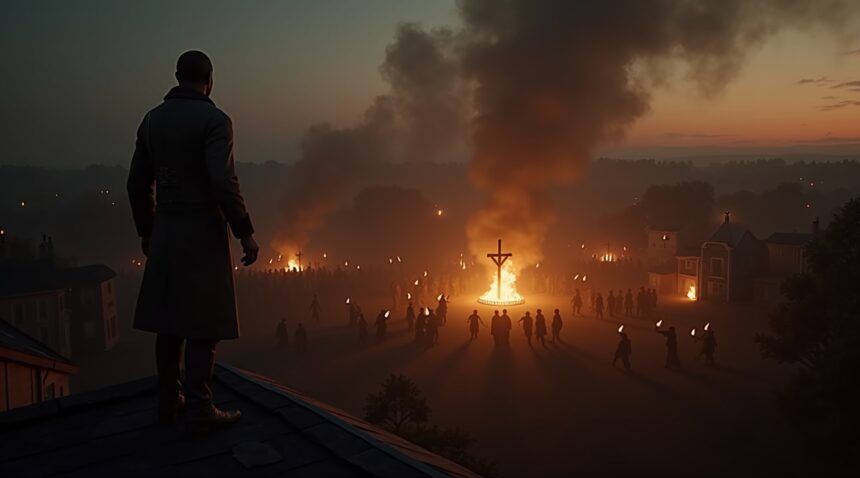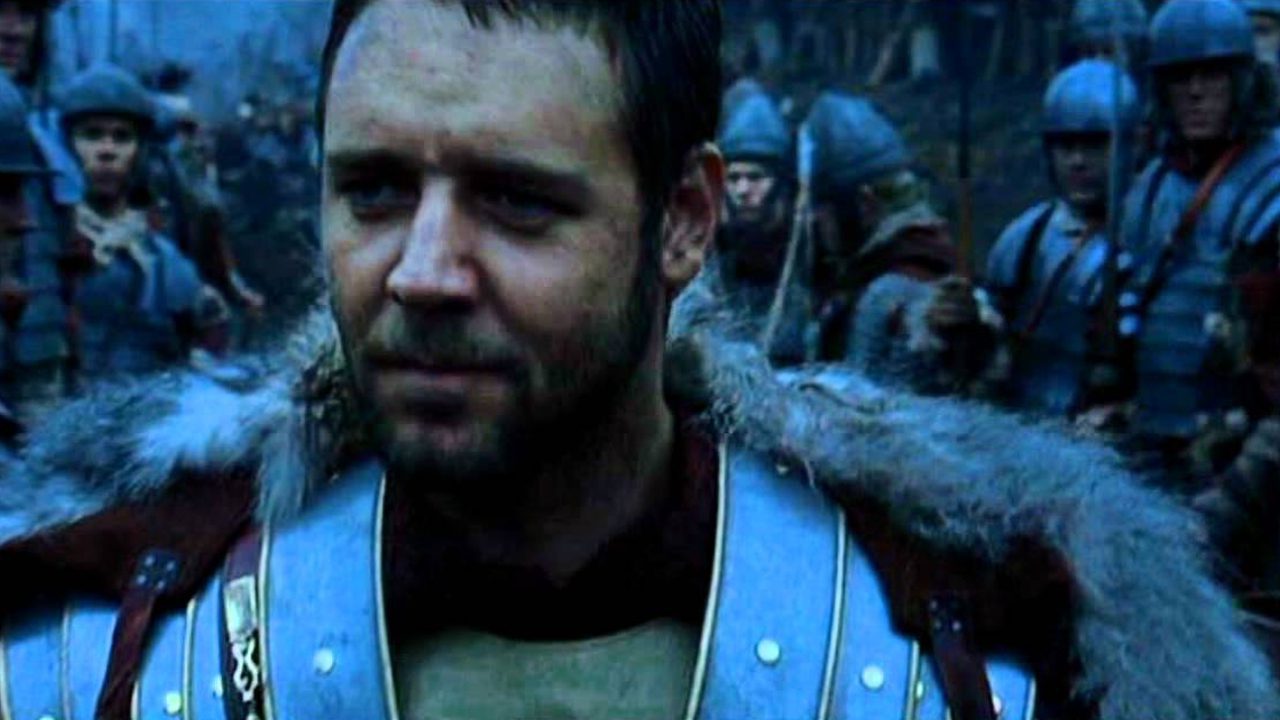Ubisoft has reportedly canceled “Project Scarlet,” an anticipated installment in the Assassin’s Creed franchise that would have explored the Reconstruction era in post-Civil War America—a setting rarely represented in mainstream video games.
Key Takeaways
- Ubisoft canceled “Project Scarlet”, an Assassin’s Creed game initially planned for a 2027 release, which was to be set in the post-Civil War Reconstruction era of America.
- The game centered on a Black protagonist, a former slave-turned-Assassin, who would have fought the Ku Klux Klan and worked to protect Black communities during one of America’s most volatile periods.
- Executives had concerns about political backlash, with internal discussions suggesting that a narrative involving racial violence and the Klan could spark controversy amid current cultural sensitivities.
- The cancellation occurred during early development, specifically the concept phase, making it a rare case where political risk took precedence over creative or technical feasibility.
- Fans and industry voices see the move as a missed opportunity, arguing that it could have provided a meaningful platform to address themes like racial justice and freedom within the format of a popular AAA franchise.
A Franchise Known for Challenging History
The Assassin’s Creed franchise has long been recognized for its willingness to tackle complex historical eras, from the Crusades and the French Revolution to the American Revolution. However, “Project Scarlet” marks a shift away from this tradition due to what appears to be a calculated avoidance of political controversy rather than technical or creative barriers.
Backlash Mirroring Assassin’s Creed Shadows
Insiders have noted similarities to the backlash Ubisoft faced for Assassin’s Creed Shadows, which featured a more diverse cast of characters and was met with racist criticism. This precedent likely influenced the decision to cancel “Project Scarlet,” despite its promising and underrepresented narrative premise.
Disappointment from Fans and Developers
Many in the gaming community and industry professionals alike have expressed frustration over the decision to shelve “Project Scarlet.” The project was seen by some as an opportunity to broaden the scope of storytelling in major video games, using historical fiction to highlight the struggles and heroism of marginalized communities during a crucial chapter in American history.
Ubisoft Scraps Assassin’s Creed Game Over Fears of Political Backlash
Ubisoft has quietly canceled a highly anticipated Assassin’s Creed project set in the post-Civil War Reconstruction era, according to five current and former company employees who spoke with Game File. The decision reportedly stemmed from corporate concerns about potential political backlash in the United States market, marking a significant shift in how the publisher approaches sensitive historical content.
Corporate Concerns Drive Cancellation Decision
The unnamed project would have explored one of America’s most turbulent historical periods, requiring developers to address deeply controversial topics including the Ku Klux Klan and systemic racism during Reconstruction. Ubisoft executives grew increasingly worried that tackling these subjects would create a firestorm similar to the online controversy that surrounded Assassin’s Creed Shadows, which featured a Black protagonist and faced significant racist backlash from certain online communities.
Company leadership described their concerns about the “US political climate” in stark terms, with one source characterizing the environment as “too political in a country too unstable to make it work.” This assessment reflects a calculated business decision to avoid potential controversy that could impact sales or generate negative publicity campaigns.
Previous Controversies Shape Current Strategy
The cancellation appears directly linked to lessons learned from Assassin’s Creed Shadows’ reception. Despite the game’s positive sales performance and generally favorable critical reception, Ubisoft faced sustained criticism and accusations of promoting woke content from vocal segments of the gaming community. These attacks created lasting concerns within the company about how politically charged historical content might be received in today’s polarized environment.
The controversy surrounding Shadows demonstrated how quickly discussions about historical representation can become weaponized in online spaces. Critics targeted the game’s diverse cast and historical interpretations, creating a public relations challenge that clearly left a lasting impact on corporate decision-making processes.
Ubisoft’s cautious approach represents a notable departure from the franchise’s established pattern of exploring complex historical periods. Previous entries have tackled sensitive subjects including the French Revolution, American Revolution, and various religious conflicts without similar corporate hesitation. The Assassin’s Creed series has historically embraced controversial historical moments as core narrative elements.
The canceled project joins other ambitious concepts that never reached completion, including various experimental settings and narrative approaches that Ubisoft has explored over the years. However, this particular cancellation stands out due to its explicitly political motivations rather than technical or creative concerns.
Industry observers note that this decision reflects broader challenges facing game publishers who must balance artistic vision with commercial viability in increasingly polarized markets. The post-Civil War setting would have provided rich narrative opportunities for exploring themes of freedom, justice, and social change that align perfectly with the Assassin’s Creed formula.
The cancellation also highlights ongoing tensions within the gaming industry about how historical fiction should address sensitive subjects. While some argue that games should tackle difficult topics to promote understanding and education, others contend that entertainment products should avoid potentially divisive political commentary.
Fans of the series may find themselves wondering what other ambitious historical settings might be deemed too controversial for future development. The decision suggests that corporate risk assessment now plays a more prominent role in creative decisions than in previous development cycles.
Despite the cancellation, Ubisoft continues developing other Assassin’s Creed projects that explore different historical periods and settings. The company’s approach moving forward will likely involve careful evaluation of how political sensitivity might impact both development costs and market reception for future titles in the franchise.

Project Scarlet Would Have Featured Black Protagonist Fighting the Ku Klux Klan
The cancelled Assassin’s Creed title, codenamed Project Scarlet, would have broken new ground for the franchise by centering on a Black protagonist navigating one of America’s most turbulent periods. The main character was designed as a former slave who gains freedom following the Civil War, eventually finding himself recruited into the secretive Assassin Brotherhood.
Character Journey and Historical Setting
The protagonist’s narrative arc would have taken players through a compelling personal journey that mirrors the broader African American experience during Reconstruction. After emancipation, the character would initially travel westward, likely seeking opportunities and safety in the expanding frontier territories. This westward movement reflects the historical reality many freed slaves faced when deciding whether to remain in the South or seek new beginnings elsewhere.
However, the story would have taken a dramatic turn as the character returns to the South, drawn back by a sense of duty and the need to confront rising injustices. This homecoming would coincide with the emergence of the Ku Klux Klan, positioning the protagonist directly against one of history’s most notorious hate groups. The Assassin Brotherhood’s recruitment would provide both the skills and philosophical framework needed to fight this growing threat systematically.
Gameplay Integration with Historical Events
Project Scarlet would have maintained Ubisoft’s signature approach of weaving fictional conspiracies into real historical events, similar to how upcoming Assassin’s Creed games tackle different historical periods. The core gameplay loop would have involved several key elements:
- Infiltrating Klan gatherings and disrupting their operations
- Protecting Black communities from violent attacks
- Gathering intelligence on Klan leadership and their political connections
- Building networks of allies among both freed slaves and sympathetic whites
- Engaging in stealth missions to expose corruption in local governments
The game would have addressed the racial and social upheaval of the Reconstruction era head-on, rather than skirting around these sensitive topics. Players would experience firsthand the challenges faced by Black Americans during this period, from economic disenfranchisement to violent intimidation tactics employed by white supremacist groups.
The Assassin’s Creed franchise has consistently explored themes of freedom and justice throughout history, and Project Scarlet would have continued this tradition while tackling uniquely American struggles. The protagonist’s fight against the Klan would have aligned perfectly with the Assassin Brotherhood’s core mission of opposing tyranny and protecting the innocent.
Unlike previous entries that often featured protagonists fighting abstract political conspiracies, this game would have confronted a very real and immediate threat to human dignity and freedom. The Klan’s documented history of violence and terrorism would have provided compelling antagonists whose actions were already well-documented in historical records.
The setting would have offered rich opportunities for exploring the complexities of post-war American society. Players might have encountered everything from corrupt politicians enabling Klan activities to brave individuals of all backgrounds who risked everything to stand against hatred. The game could have shown how Assassin’s Creed’s trademark blend of personal vendettas and larger historical forces played out in this uniquely American context.
Project Scarlet represented an ambitious attempt to use the Assassin’s Creed formula to examine one of America’s darkest chapters while celebrating the courage of those who fought against oppression. The cancellation of this project removes what could have been a groundbreaking entry in the franchise’s history of tackling difficult historical subjects.

Game Was Planned as Next Mainline Entry for 2027 Release
Steven Totillo’s reporting for Game File revealed that Ubisoft had positioned this post-Civil War Assassin’s Creed installment as their next mainline entry, targeting a 2027 release window. Internally, the development team referred to the project as “Project Scarlet,” which only progressed to the concept phase before facing cancellation during summer 2025.
Development Timeline and Internal Status
The ambitious scope of Project Scarlet marked a significant departure from Ubisoft’s recent approach to historical settings. While previous entries like Assassin’s Creed Syndicate explored Victorian London—a period often viewed as less politically contentious—this installment would have directly confronted the harsh realities of Reconstruction-era America. The game’s early cancellation suggests that Ubisoft encountered substantial challenges during the conceptual development phase, whether technical, creative, or strategic in nature.
I find it particularly noteworthy that the project reached only the concept stage before termination. This early cancellation indicates that fundamental concerns arose during the initial planning phases, potentially related to the sensitive historical subject matter or market considerations. The 2027 release target would have positioned Project Scarlet as a major franchise entry, likely following Assassin’s Creed set in feudal Japan and other upcoming titles in Ubisoft’s pipeline.
Historical Setting Challenges
The post-emancipation period presents unique narrative challenges that distinguish it from other Assassin’s Creed settings. Unlike the franchise’s typical approach of embedding fictional conflicts within historical backdrops, Project Scarlet would have required direct engagement with systemic racism and the struggles of newly freed enslaved people. This represents a stark contrast to previous entries that often sidestepped contemporary political sensitivities by focusing on ancient civilizations or distant historical periods.
The decision to tackle overt racist antagonists and post-emancipation struggles would have required careful handling to maintain historical accuracy while delivering engaging gameplay. Previous Assassin’s Creed titles have generally avoided direct confrontation with such explicitly charged political themes, preferring to explore power struggles between fictional factions like Assassins and Templars rather than real-world ideological conflicts.
Ubisoft’s track record with ambitious Assassin’s Creed concepts suggests that the company isn’t afraid to explore unconventional ideas, but Project Scarlet’s cancellation indicates that some concepts prove too challenging to execute effectively. The timing of the cancellation—during the concept phase—suggests that fundamental concerns about the project’s viability emerged early in development.
The franchise has successfully explored various historical periods, from ancient Egypt to Revolutionary War America, but the post-Civil War era presents unique sensitivities that may have proven difficult to balance with the series’ entertainment-focused approach. While fans have shown enthusiasm for direct sequels and new settings alike, Project Scarlet’s subject matter would have required exceptional care in its execution.

Fans and Industry React with Disappointment to Lost Creative Opportunity
The cancellation reports have triggered widespread frustration across gaming communities and industry professionals alike. Actor Ralph Ineson, who appeared in both the Fantastic Four films and previous Assassin’s Creed titles, voiced sharp criticism that captured the broader community sentiment. He expressed disappointment with Ubisoft’s pattern of backing away from potentially meaningful narratives that could explore important historical periods.
Industry observers describe the decision as a significant missed opportunity for creative storytelling. The post-Civil War era offers rich material for exploring themes of reconstruction, freedom, and social transformation through the franchise’s signature blend of historical fiction and action. Many fans had expressed enthusiasm for experiencing this pivotal period in American history through the Assassin’s Creed lens.
Market Success Contradicts Industry Fears
Critics point to Ghost of Tsushima as compelling evidence that historical games featuring diverse protagonists can achieve both commercial and critical success. The game’s strong performance suggests that concerns about market reception may be misplaced. Several industry analysts argue that audiences actively seek authentic historical experiences that don’t shy away from complex social issues.
The gaming community’s reaction reflects broader frustrations with major publishers’ apparent reluctance to tackle sensitive historical subjects responsibly. Many fans express concern that this pattern limits the medium’s potential to engage with important historical narratives. Some community members have drawn connections to Assassin’s Creed’s original ambitious scope, questioning whether the franchise has become too conservative in its creative choices.
Professional game developers have also weighed in, with several suggesting that the industry’s risk-averse approach ultimately limits artistic growth. They argue that historical games carry unique responsibilities to represent periods accurately while creating engaging entertainment. The post-Civil War setting would have provided opportunities to explore themes of liberation and social change that align with the Assassin’s Creed narrative framework.
Community discussions reveal particular disappointment given the franchise’s history of tackling complex historical periods. Fans note that previous entries successfully navigated challenging subjects like the American Revolution and Renaissance politics. The cancellation raises questions about whether modern gaming’s commercial pressures are constraining creative ambition in ways that weren’t present during the series’ earlier development. This decision stands in contrast to recent announcements about upcoming entries in feudal Japan, highlighting inconsistencies in the publisher’s approach to historical settings.

Reconstruction Era Setting Would Have Been Unprecedented for AAA Gaming
The canceled Assassin’s Creed project would have represented a groundbreaking moment for mainstream gaming by tackling the Reconstruction Era (1865–1877), one of America’s most turbulent and underexplored historical periods. I find it fascinating that Ubisoft considered diving into this complex chapter, as it would have marked the first time a major AAA studio committed to exploring the aftermath of the Civil War in such depth.
An Untapped Historical Goldmine
The Reconstruction period offers exactly the kind of rich historical backdrop that makes Assassin’s Creed games compelling. I can envision how the series’ signature blend of historical fiction and conspiracy theories would have worked perfectly within this era’s existing tensions. The period’s defining characteristics – attempts to integrate freed slaves into society, violent resistance from white supremacist groups like the Ku Klux Klan, and massive social upheaval – would have provided fertile ground for the kind of morally complex storytelling that defines the franchise.
This setting choice becomes even more intriguing when considering how few major video games have explicitly addressed this era. While the Civil War itself has received some attention in gaming, the Reconstruction period remains largely untouched by mainstream developers. The canceled project would have filled a significant gap in historical gaming representation, potentially opening doors for other studios to explore similarly challenging periods.
Breaking New Ground for AAA Gaming
Incorporating themes of racial violence, systemic oppression, and social reconstruction would have pushed boundaries that most AAA studios typically avoid. I believe this approach could have elevated the medium’s capacity for meaningful historical commentary. The game’s focus on the period circa 1860s–1870s would have positioned players within a society struggling to redefine itself after devastating conflict.
The potential for exploring secret societies and hidden conspiracies – core elements of the Assassin’s Creed formula – seems particularly rich within this context. Secret organizations like the KKK already existed during this period, making the leap to fictional Templar involvement feel natural rather than forced. Ubisoft’s willingness to explore different historical settings has always been a franchise strength, but this particular era would have demanded unprecedented sensitivity and research.
The game’s cancellation represents a missed opportunity for the industry to demonstrate that AAA gaming can tackle difficult subjects responsibly. I see this as particularly relevant given ongoing discussions about representation and historical accuracy in video games. The project could have set a new standard for how major studios approach challenging historical periods, potentially influencing other developers to take similar risks.
The social dynamics of Reconstruction-era America would have provided natural conflict for gameplay mechanics. Players might have navigated between different factions:
- Federal troops
- Local militias
- Freed slaves organizing for their rights
- Various white supremacist groups
This complexity would have created the kind of morally ambiguous choices that make Assassin’s Creed narratives compelling.
The cancellation also highlights broader industry challenges around controversial content. While Assassin’s Creed has explored various historical periods, few have carried the same potential for contemporary political interpretation as Reconstruction-era America. The decision to shelve this project likely reflects concerns about market reception and the complexity of handling such sensitive subject matter.
I believe this canceled game represents what could have been a watershed moment for historical gaming. The Reconstruction Era’s combination of political intrigue, social upheaval, and moral complexity would have provided exactly the kind of rich storytelling environment that distinguishes great historical fiction from mere period pieces. Ubisoft’s development decisions continue to shape how the industry approaches historical content, making this cancellation particularly significant for understanding the current limits of AAA gaming’s willingness to engage with difficult history.
Sources:
Game File: Reporting by Steven Totillo
GamesRadar: “Fantastic Four and one-time Assassin’s Creed actor reacts to Ubisoft’s cancellation of a post-civil war era game in the most appropriate way possible”
YouTube (Gaming News): “Ubisoft canceled Assassin’s Creed game set after civil war”


